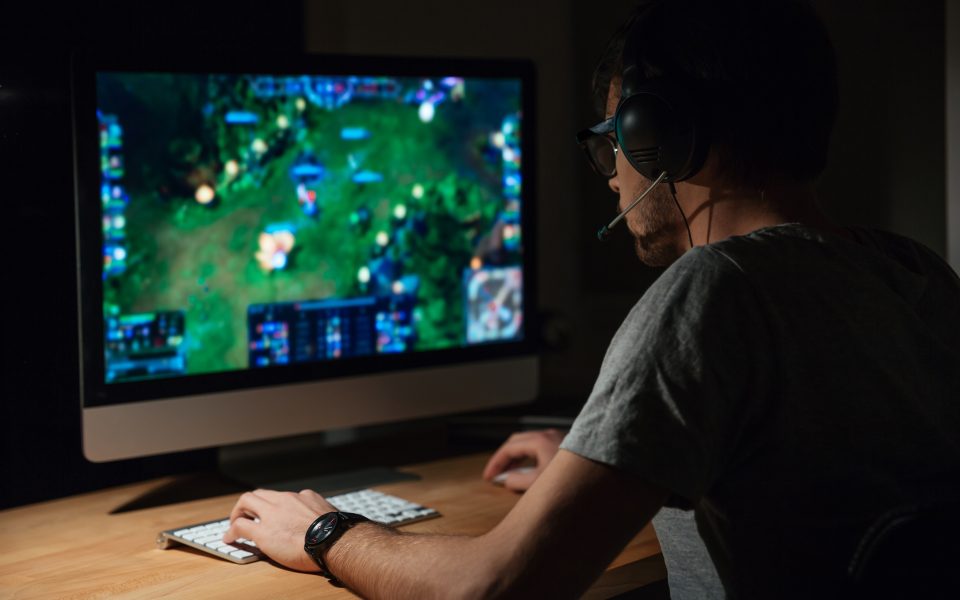Helping virtual world addicts return to reality

He had to use the metro to come to our meeting. He kept his head down for the entire ride, focusing on a spot on the floor to get over the suffocating feeling due to being among so many people. He can’t venture out of his house more than two or three times a week. More than that makes him have a panic attack.
For years, though, he could hardly bring himself to leave his room: It was his life, as he spent day after day, sleepless, in front of his computer, entirely absorbed by some game or another.
“When I sit still, I can’t sense the passage of time. I’ve lost that feeling. I also forget a lot. My brain just doesn’t care about anything other than gaming,” says Thanasis. He is 28, with a thin beard and wire-framed prescription glasses.
We met at the Gaming Addiction department of the 18 Ano (18 and Above) rehabilitation center, where he is getting treatment. He agreed to talk on the condition that his real name is not divulged.
Like most kids, he got into gaming with Amiga and PlayStation. “The internet got me hooked,” he says, adding that he became absorbed in multiplayer role-playing games like the massively popular World of Warcraft (WoW) and League of Legends (LoL).
“I was on a schedule,” he says, explaining that he reached the point where he was playing up to 20 hours a day, with brief nap breaks.
As the addiction took hold, he started losing friends. All he wanted to talk about was the action on his screen and they weren’t interested.
He dropped out of university and hadn’t been on a date, to a movie or on holiday for six years. He spent a total of just two weeks away from Athens in that time, visiting players he met through Lineage in other cities – needless to say, much of those visits was spent in front of a computer.
“I played because I was looking for pleasure and escape, but that’s not what I got. I felt terrible when a game ended, like I needed to play again,” says Thanasis, describing addiction’s vicious cycle.
The World Health Organization recently recognized gaming addiction as a mental health condition. This important development will help in the development of medical research, diagnostic models and treatment, Dr Petros Levounis, head of the Psychiatry Department at Rutgers University in New Jersey and an expert on addiction, tells Kathimerini.
Ten years ago, while working on an epidemic of methamphetamine use in New York, Levounis had observed that a number of patients displayed compulsive sex behavior as well. That led him to study behavioral addictions and later to branch out into gaming addiction.
Gamers, he observed, displayed similar withdrawal symptoms (anxiety and sleep disorders, among others) to people coming off drugs like cocaine.
In the meantime, the extent of the problem was also becoming apparent to experts in Greece as well. In 2008, the KETHEA rehabilitation center noticed that most of the teenagers it was treating for cannabis addiction were also addicted to electronic games.
In the last six years, moreover, 125 teens and around 350 parents have sought help from the specialized program KETHEA then set up.
Right now, it is counseling eight minors and 35 parents, and another 22 parents are waiting to consult its experts about their children.
When is a gamer considered an addict, though? Anastasia Vlachogeorgaki, an addiction adviser and family counselor, explains that gaming becomes excessive when players are no longer functional in other aspects of their lives, when gaming becomes their main occupation.
“We’re not saying that everyone who plays a game will get addicted. A lot of people play. That’s why we focus on the issues that lie behind the addiction,” says psychiatrist Stella Christides, the scientific supervisor of the gaming addiction program at 18 Ano.
The center takes in adults who have deep-seated addictions and often display symptoms of a pre-existing psychopathological condition.
Anxiety, depression and learning disabilities are some of the underlying conditions gaming addicts struggle with – even attention deficit disorder, according to some experts, while Christides has heard of patients talking about being bullied when they were younger.
“They have trouble dealing with reality, so they isolate themselves in their homes,” she adds.
Thanasis says that things could have gone a lot differently for him if there was more public awareness concerning gaming addiction and how to deal with it from a young age.
Vlachogeorgaki, meanwhile, stresses that parents shouldn’t use labels with their children. Telling them they’re addicted is not helpful, she stresses, adding that the school holidays can be especially stressful for parents trying to curb their kids’ internet use.
“They need to adopt a calm and conscientious approach, and keep their children busy with other activities,” she advises.
In the 10 years since he started researching gaming addiction in the US, Levounis has been getting more and more adults to admit that they have a habit. He adds, however, that this may not be the main issue.
“They feel stressed and miserable, and may be looking for any explanation for their conditions,” he says, giving the example of an 18-year-old schizophrenic patient he treated whose parents had originally thought was a gaming addict.
There are 30 adults in 18 Ano’s gaming addiction program right now and all are men, as is often the case. Christides says that losing track of time is one of the main signs of addiction.
“Users play for longer than planned and this starts to become a priority over other activities. Then they can’t stop even if they see the negative effects,” she says.
Epameinondas, 35, was in that place a couple of decades ago, having spent six months during his university years without leaving the house.
He kept in basic contact with his parents, went up to three days at a time without sleep and only ate takeaway food. He too segued from console games to online games like WoW. “They never end,” he says.
With time, he managed to control the amount of time he spent playing online games. He got a degree in IT, found a job and kept his friends, even though he still spent eight hours a day playing. He realized that this was too much when he had a family of his own.
“Gaming is exhausting. When you reach 30, going without sleep for two nights is tough,” he says.
How is gaming addiction treated? All the experts Kathimerini spoke to said that psychotherapy is one of the key tools. Drugs can also help in cases where there are underlying mental health issues.
Epameinondas, who is getting treatment at 18 Ano, hasn’t played since January. “We said I’d try it for a week and now it’s been months,” he says as we talk in one of the program’s offices, explaining that he has found other activities to keep him occupied.
Likewise, Thanasis is trying to curb his habit. He sleeps more and doesn’t log on as soon as he wakes up, but spends time with his parents and doing chores. He no longer eats at his desk in his bedroom. On the afternoon we met, he’d gone five hours without gaming.
“I’m 28 and have done nothing with my life. That scares me,” he admits. “How much longer can my parents support me?”
He remembers entire days when he’d speak nothing but English. This communication with other players created the illusion of social interaction. “I was lost in a virtual world,” he says.
“Some people want to make money, others to travel. I didn’t have any goals. I didn’t even want to play until I died. I’ve only recently started thinking about goals. I want to complete my treatment, get a job and have a family of my own.”





